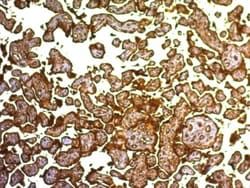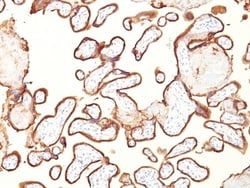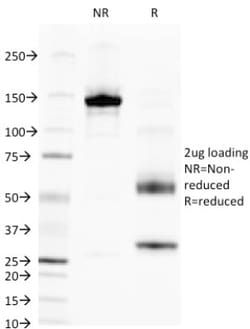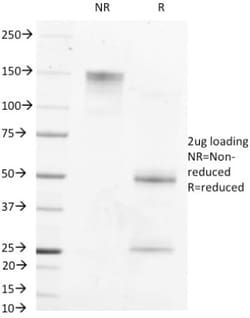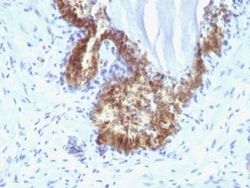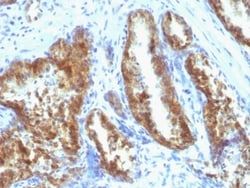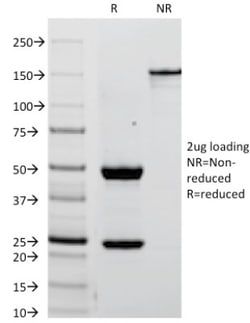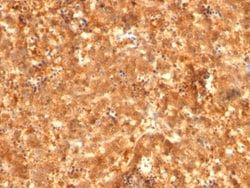Alkaline Phosphatase/ALPP Antibody (ALPP/238), Novus Biologicals™
Mouse Monoclonal Antibody
Manufacturer: Fischer Scientific
The price for this product is unavailable. Please request a quote
Antigen
Alkaline Phosphatase/ALPP
Concentration
0.2 mg/mL
Applications
Flow Cytometry, Immunohistochemistry (Frozen), SDS-Page, Immunofluorescence
Conjugate
Unconjugated
Host Species
Mouse
Research Discipline
Cancer, Embryonic Stem Cell Markers, Ovarian Carcinoma Cell Markers, Stem Cell Markers
Formulation
10mM PBS and 0.05% BSA with 0.05% Sodium Azide
Gene Alias
Alkaline phosphatase Regan isozyme, alkaline phosphatase, placental, alkaline phosphatase, placental (Regan isozyme), alkaline phosphatase, placental type, alkaline phosphomonoesterase, ALP, EC 3.1.3.1, FLJ61142, glycerophosphatase, PALP, Placental alkaline phosphatase 1, PLAP, PLAP-1, Regan isozyme
Gene Symbols
ALPP
Isotype
IgG2a κ
Purification Method
Protein A or G purified
Test Specificity
PLAP is a tissue specific, trophoblast-derived, 70kDa, glycosyl-phosphatidylinositol (GPI)-anchored, dimeric, Zn2+ metallo glycoprotein that catalyzes the hydrolysis of phosphomonoesters into an inorganic phosphate and an alcohol. It is present in the placenta and serum of pregnant women and in high frequency in gynecological and testicular cancers and in lower frequency in other tumors. The three tissue-specific AP's in humans, PLAP, germ cell AP (GCAP) and intestinal AP, are 90-98% homologous. Non-tissue specific AP is found in kidney, liver and bone. This MAb binds equally well to all common allelic variants (S, F, FS and I) of PLAP as to AP from normal human testis. This MAb can be used both as coating as well as tracer antibody in the same ELISA to detect PLAP in serum of S, F, FS and I phenotypes.
Clone
ALPP/238
Dilution
Flow Cytometry 0.5 - 1 ug/million cells in 0.1 ml, Immunohistochemistry-Frozen 1.0 - 2.0 ug/ml, SDS-Page, Immunofluorescence 0.5 - 1.0 ug/ml
Classification
Monoclonal
Form
Purified
Regulatory Status
RUO
Target Species
Human
Gene Accession No.
P05187
Gene ID (Entrez)
250
Immunogen
Recombinant full-length human ALPP protein
Primary or Secondary
Primary
Content And Storage
Store at 4C.
Molecular Weight of Antigen
70 kDa
Description
- Ensure accurate, reproducible results in Flow Cytometry, Immunohistochemistry (Frozen), Immunofluorescence Alkaline Phosphatase/ALPP Monoclonal specifically detects Alkaline Phosphatase/ALPP in Human samples
- It is validated for ELISA.
